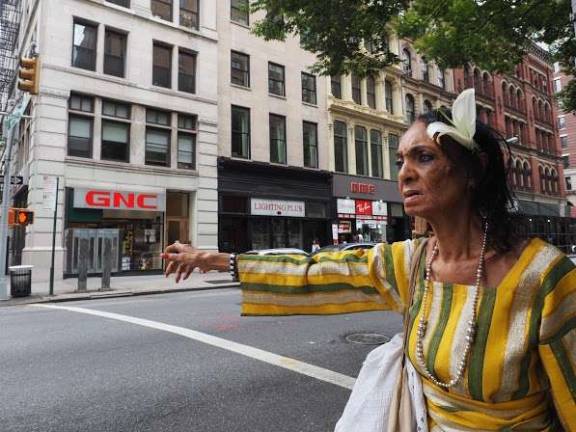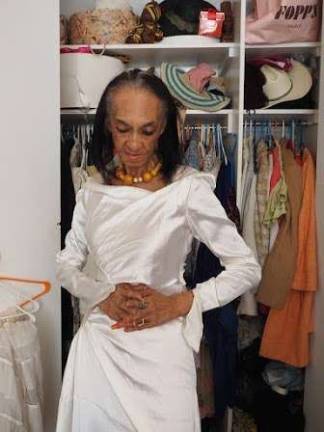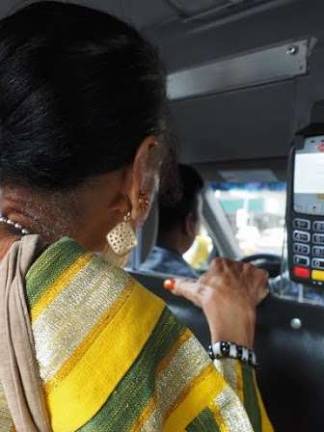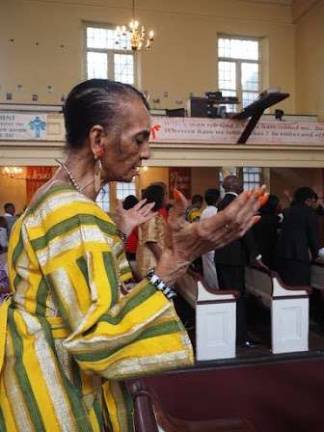Soothing the pain Fifth of six parts




Jacquie Murdock, 84, was dealt a double whammy within weeks. First, she woke up with an intense pain by her right ear. (“It feels like someone had an icepick and was stabbing me,” she described.) A few weeks later there was a searing pain in her spine that traveled all the way down to her calf.
She was diagnosed with shingles and sciatica.
It's been weeks since she was able to attend her bi-weekly dance class in Harlem, and weeks since she was able to attend her church in Chinatown. An active and spiritual person, this greatly bothers Jacquie. She hates being cooped up at home.
But today is a special day at Mariners' Temple Baptist Church. It's Homecoming, a time when members past and present gather together, and Jacquie refuses to miss it.
Jacquie's faith is extremely important to her and it keeps her going through the disappointments and challenges in life, including her recent illnesses. It comforts her as she ages and thinks about the end of life, and the heavenly life she believes is beyond.
“I'm not afraid of dying,” she says. “To be out of the body is to be in the presence of God.”
Today, for her return to church, she took special care in dressing. She was going to wear a suit but was told her to wear traditional ethnic clothing so she put on a yellow, cream and gold African dress that she had custom made in Harlem out of material from Nigeria. It's one of her favorites. She added a string of grey pearls accented with crystals around her neck and a white flower in her hair. She is excited to debut the new Michael Kors platform sandals she bought the day before at Macy's.
It's just a few minutes before 10:30 a.m. when Jacquie heads down to the lobby of her apartment building in Greenwich Village. She stops by the front desk and chats with the doorman for a minute, mentioning the excruciating pain she's been in.
When Jacquie was healthier she sometimes would take the train to the church on Henry Street, but isolated from close subway access, it would require a half-mile walk.
Although she lives with her daughter and granddaughter, they are not churchgoers so Jacquie travels alone. She can't take the walk anymore and now reluctantly relies on cabs to get her there. She dislikes the added expense and has had to deal with cab drivers, whom she finds can be impatient with her at times.
Jacquie exists her building and walks a couple of blocks to hail a cab at Great Jones Street and W. 3rd Street. Cabs fly by as Jacquie stands on the corner.
“I'm in agony,” she says. The shingles have gotten better but the sciatica has only grown worse.
Jacquie's doctor prescribed both a strong pain killer and muscle relaxer to help her deal with her ailments. She wasn't due to take the pain killer until 11 a.m., but her intense pain forced her to take it an hour early. It's too soon to take another.
Jacquie mutters to herself that she has to figure out how to use Access-A-Ride. She's been meaning to sign up for months.
Finally, after 10 minutes of waiting, a cab stops. Jacquie opens the door and slides into the car, wincing.
“I'm in pain when I sit down. I'm in a lot of pain,” she says. She gives the driver the address of the church.
After just a few minutes, the taxi has hit traffic and is at a crawl.
“Please, I'm in a hurry. I have to go to church at 11,” says Jacquie.
“There's traffic,” says the driver in an accent Jacquie can't understand.
“What'd he say?” says Jacquie. “This is going too slow” she mutters to herself. “New York is overcrowded.”
Another few minutes pass.
“This is taking way too long,” says Jacquie. “Are we are Mott Street yet?”
The driver says something Jacquie can't hear from the back seat.
“Is this Mott Street?” she says louder.
Again the driver says something inaudible.
“Can you turn?” Jacquie asks the driver.
Both are growing agitated.
“I already made a right on Mott,” the driver says more audibly.
“Oh I didn't realized,” says Jacquie.
He stops, and she pays the $9 fare, adding a tip.
“I'm sorry. I didn't see. I'm blind,” says Jacquie. She lost her sight 15 years ago from glaucoma and cataracts. On some days she can see a little out of her right eye but it depends on the lighting conditions. Today is a sunny day which means her sight is all but absent. Jacquie also suffers from some hearing loss and atrial fibrillation.
The taxi pulls over, double parking next to a grey car, which Jacquie doesn't see. She opens the taxi door and it brushes up lightly against the other car. She lifts herself out and exits.
The car driver yells out “You moron!” but Jacquie doesn't seem to hear.
“He was slow like molasses,” says Jacquie. “I can't see because of the sun and I can't understand his accent because of my hearing.”
She navigates the route to the church by memory, walking as fast as she can. The church, founded in 1795, is the oldest Baptist Church site in Manhattan.
Jacquie enters the lobby and a man sees and approaches her. “How have you been, Mother Murdock?” He embraces her.
“I'm late,” she says.
Jacquie enters the sanctuary and immediately a few deacons approach to take her arm and lead her up the aisle.
The service has barely started and people are still walking in.
Jacquie sits in her regular seat near the front of the church, just as the pastor greets the congregation: “Welcome everyone. Happy homecoming to you.”
The pastor gives the congregation several minutes to say hello to each other. Parishioners rise from their seats and greet one another with hugs, a handshake or a kiss on the cheek. “Hello Mother Murdock;good to see you, Mother Murdock,” they say to Jacquie.
“Thank you Lord, thank you Lord,” she says, happy to have made it to back to church, a place that means so much to her.
* * *
Jacquie has been coming to Mariners' Temple Baptist Church for decades. Born an Episcopalian, she switched to the Catholic Church before finding her spiritual home at Mariners' Temple. Years ago her friend Arlene had said she found a “rocking church in Chinatown” and after one visit Jacquie was sold. She is drawn to the exuberant music, which includes tambourines and drums. “[When I'm at church] I am visualizing myself dancing to that music.”
Jacquie sang in the choir for 20 years and once she turned 65 was invited to become a Mother of the Church, a special ministry for older women. The church means so much to her that she wants it to be the location of her final earthly celebration— her funeral.
She already has much of it planned out, including readings and the songs she'd like the choir to sing.
She is at peace with death and considers it to ultimately be a positive part of life.
“I was in choir. You know how many funerals I've sang at? I feel fine with it. Baptist funerals are all (singing:) 'No more dying there. I am going to see the king. No more crying there. I am going to see the King.'”
Besides, so much has changed since her birth in 1930. She's worried about the state of the world.
“I'll be in a better place because this place is spinning out of control. It's just horrible. I better start reading revelations,” she half-jokes.
She's already picked out—and changed her mind twice—about her burial dress.
First it was an off-white dress with a high lace collar and long sleeves. Most recently it's a silky long bias cut dress. Both are hanging in her closet, ready for the day she meets the King.
On a recent visit to her apartment she tries on the dress and poses with her hands clutched together over her abdomen.
“I'll hold the cross like this,” she says, demonstrating. “I want to look beautiful and have a flower in my hair.”
She's written all of the arrangements in a book and is leaving her son, Michael, in charge.
“It's better than having them run around like a chicken with its head cut off,” she says. “It's a fact [that one dies]. It's a reality. My sister died in her bed. I would like to die that way but it's not for me to say. “
The one detail Jacquie still has to iron out is where she will be buried. She inquired about a plot in Woodlawn Cemetery but it was was more than she could afford. There was talk about a cheaper section opening up; she needs to inquire further.
“I would have to check out the payment plan, but I don't know,” she says.
* * *
The service continues with prayers.
Jacquie asks the church Mother, who's seated directly in front of her, if she can go up to the front of the church for a blessing. A lady helps her walk to the front and she sits in a chair in front of the altar. A dozen and a half others make their way up to the front, some sitting and some standing.
The music beings:
“Fill me up God.”
“Fill me up God.”
“Fill me up.
People hold hands and the music grows louder.
A church leader says:
“Father God, we ask you to please bless us with your power. Father God, we ask you to come in this place of God. You are the God of healing. Father God we ask you to come right now and do your miracle work. Anoint these people with your healing power.”
Jubilant clapping begins. In front, Jacquie raises her hands up and moves her head in prayer. She looks at peace.
When the music ends, the parishioners walk back to their seats. Jacquie is assisted by a deacon.
It's time for tithes. The pastor explains that parishioners should tithe 10% of their salary. Jacquie is on a tight budget but wants to make a contribution. She fills out a check and slips it into an envelope.
“I want to contribute more, but I don't have that kind of money anymore.”
When it's time, she joins the line to walk up to the front, deposits her envelope in the basket, and returns to her seat.
The choir sings:
“It's so amazing, your love for me.”
Parishioners are beginning to stand up and sing. Despite her pain, Jacquie slowly stands up and claps. She dances a little in her pew. She closes her eyes and sings along:
“Ohhh Amazing, amazing.”
“It's so amazing, your love for me.
“Yes, Lord,” says Jacquie.
When Jacquie sings, she says the pain disappears for that moment. She'd rather sing the pain away than conceal it with a pill.
“I got an Oxycodone in my pocket but I don't want to take it. I don't want to get in the habit of taking it every time I hurt. That's how you get hooked,” she says.
The pastor launches into her sermon: “Think about how good God has been.”
“God has been so good to me, even with the pain, he's been so good to me,” says Jacquie aloud. “I am so grateful.”
“God is still providing. God is still protecting,” says the Pastor.
“Hallelujah” says Jacquie clapping.
The service continues for a couple of hours.
After the service concludes, Jacquie enjoys a homecoming dinner with the other parishioners. She is seated at a table reserved table for the Mothers of the Church. She spends the afternoon talking to new parishioner whom she hopes becomes a friend.
“The spirit is here,” says Jacquie. She feels better that she came in spite of her pain.
“I had to come. I was determined to come. It's been too long.”
Tomorrow, Jacquie will go to the doctor. She desperately hopes a doctor will be able to figure out an antidote to her pain. The pills, despite a recent increase in dose, aren't working well enough, but she wants to avoid surgery.
In the meantime she will pray.
“I'm putting it in God's hands.”
This series is a production of the Robert N. Butler Columbia Aging Center at Columbia's Mailman School of Public Health. It is led by Dorian Block and Ruth Finkelstein. It is funded by the New York Community Trust. To find all of the interviews and more, go to www.exceedingexpectations.nyc